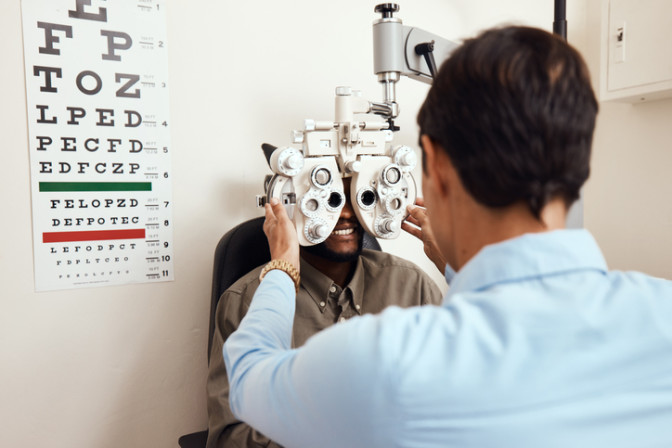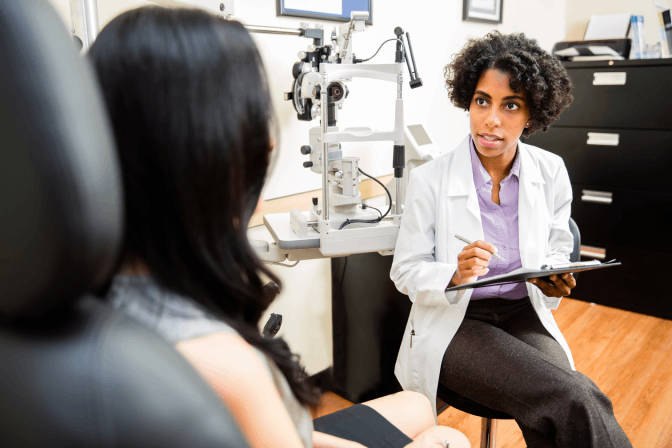Buy one pair of eyeglasses, get a second pair 50% off!
*Restrictions apply. Click here for details.

Diabetic Eye Exams vs. Regular Eye Exams
At EyeCare Associates, we understand the extra vigilance and care required to deal with diabetic eye conditions. If you are suffering from type one or type two diabetes, it’s important for you to get a diabetic eye exam at least once a year. But what is a diabetic eye exam, and how does it differ from regular eye exams?
In this article, we pull on our years of expertise in treating diabetic eye conditions to explain the difference between the two and why you need specialized diabetic eye care.
What to Expect from a Standard Eye Exam

Eye exams aren’t just about getting the right glasses or contacts; they’re a crucial part of keeping your eyes healthy. During a standard exam, we start by assessing your vision clarity using a Snellen chart. This chart displays rows of letters that get gradually smaller the farther down the chart they go. Then, with the help of a phoropter, we pinpoint the perfect prescription for your eyes.
If you opt for a comprehensive exam, we’ll dilate your pupils to get a detailed look inside your eyes. Although dilation can make your vision blurry temporarily, it’s a critical step for detecting hidden eye conditions early on. Using advanced tools like an ophthalmoscope and slit lamp, we examine the internal and surface structures of your eyes thoroughly.
The Main Purpose of Regular Eye Exams
The goal is simple: to update your prescription and ensure you’re seeing as clearly as possible. But at EyeCare Associates, we take it a step further by also focusing on your overall eye health, aiming to detect and manage any conditions before they can affect your vision. This includes eye diseases such as glaucoma and macular degeneration.
A Detailed Look at Diabetic Eye Exams

For those managing diabetes, eye exams are even more critical. Diabetic eye exams include everything you’d expect from a comprehensive exam, but they’re specially designed to catch diabetes-related eye issues. They do this by focusing on the retina and the back of the eye, where conditions like diabetic retinopathy target blood vessels. A diabetic eye exam involves a few specific tasks:
Talking About Your Health History
We’ll discuss your diabetes and family health history to tailor the exam to your needs, focusing on potential diabetic eye conditions. These questions are designed to assess your current eye health, check progress if you’ve had treatment, predict the probability you will develop a diabetic eye condition, and come up with a unique treatment plan to meet your eye care needs.
Pupil Dilation
Yes, unfortunately, diabetic eye exams require your pupils to be dilated, too. Dilating your pupils lets us examine the back of your eye closely, crucial for spotting signs of diabetic eye diseases. In fact, it’s even more important for your eyes to be dilated during a diabetic eye exam than a regular eye exam, as many diabetic eye conditions develop at the back of the eye and don’t show noticeable symptoms in their early stages.
Optical Coherence Tomography (OCT)
Think of this as a CT scan of your eyes. This scan gives us a detailed view of your retina, helping us spot any damage or changes early on. Doctors can view cross-sections of the retina to check for hidden damaged or leaking blood vessels, which can help them identify any conditions that are forming below the surface.
Digital Retinal Imaging
This procedure is exactly what it sounds like. We have you put your eyes next to a special camera and take a high-resolution digital photo of your eyes. Specifically, we’re taking photos of your retina to identify early signs of diabetic eye conditions and track any progression. The camera does require a flash, so you’ll experience a momentary afterimage in your eyes right after the photo is taken, but your eyes will be unharmed, and the afterimage will fade quickly.
Glaucoma Testing
Given the increased risk of glaucoma with diabetes, we check your eye pressure as a preventive measure against this condition. This is done with a special instrument that is placed up to your eye and measures intraocular pressure.
Vision Accuracy Check
Just like with a regular eye exam, we check your vision using a Snellen chart. Reading from a vision chart not only tests your visual acuity but also helps us identify any diabetes-induced vision changes.
The Critical Role of Diabetic Eye Exams
Unlike regular eye exams, which are primarily focused on updating prescriptions and basic health checks, diabetic eye exams are designed to detect and manage conditions specifically associated with diabetes. This includes paying close attention to the retina, where many diabetes-related eye issues manifest. Regular diabetic eye exams are pivotal in diagnosing such conditions early, enabling timely treatment to prevent significant vision impairment or loss.
For individuals with diabetes, these exams are a crucial component of managing their overall health, as eye conditions related to diabetes often progress silently, lacking noticeable symptoms until they’ve advanced significantly. By keeping up with regular diabetic eye exams, you can take a proactive stance in preserving your vision and preventing irreversible damage.
Your Partner in Diabetic Eye Health: EyeCare Associates
Choosing EyeCare Associates means entrusting your vision to a team that’s not just equipped with the latest in eye care technology but is also deeply committed to your health and well-being. With 31 locations across Alabama, we’re dedicated to providing accessible, high-quality eye care. Whether you need specialized care for diabetes-related eye conditions or a comprehensive eye exam, we’re here to offer the support and services you need. Let’s work together to keep your eyes healthy and your vision clear.
Contact us today to schedule your next eye exam and take a step towards comprehensive eye health.
